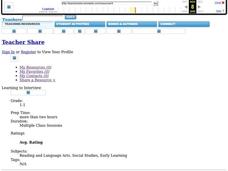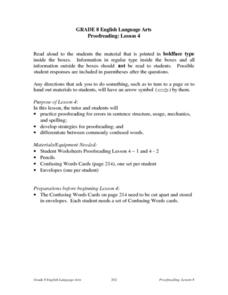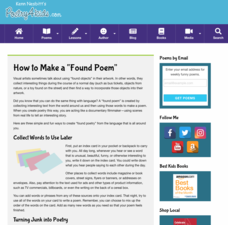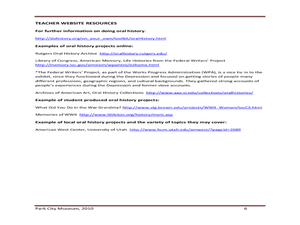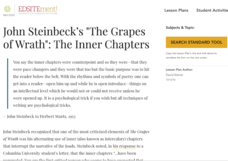Curated OER
Vocabulary Building Activity
Four weeks of vocabulary words are provided here! Each week has between six and seven vocabulary words for your young learners to master. First they hear each word, and then they get a short definition for each word. The second activity...
Curated OER
Developing an Outline
A lot of writers don't like creating an outline before writing the first draft of their paper. Introduce them to what an effective and organized outline looks like with this presentation. Designed for higher education, you could easily...
Curated OER
Vocabulary Building Activity
The four worksheets here are provided to introduce your learners to new vocabulary on Monday, Tuesday, Wednesday, and Thursday. Each list contains seven vocabulary words focused on a specfic vowel pair. First the learner hears the word,...
Curated OER
A Weigh we Go!
Here are some cross-curricular activities whil should help your kids understnad weight measurements and grammar. In this grammar and math lesson, students read the book Skittles Riddles and practice counting and balancing skittles. They...
Curated OER
The Great Gatsby Historical Background Using Multi-Genre Research Project
Before beginning F. Scott Fitzgerald's The Great Gatsby, create a historical context of the Roaring 20s with this lesson. Set up a gallery walk with the provided PowerPoint, which features 10 topics related to the 1920s. Then begin a...
Curated OER
Getting to Know You
After going over the five steps of the writing process, pupils fill out "Getting to Know You" worksheets. They trade papers with each other, and have the task of writing a descriptive paragraph about the person whose worksheet they...
Florida Center for Reading Research
Phonics: High Frequency Words, Sand Paper Words
Learners use a stack of words embellished with tactile elements, such as sandpaper, to practice high-frequency words. Pupils trace the tactile surface of each letter in the word, write it on their paper, then find and glue that word from...
Curated OER
A Way with Words
How do facts and opinions impact the news? After reading "How to Cover a War" from the New York Times, middle schoolers evaluate the claims in the article. They also consider the media's responsibilities in reporting during wartime....
Curated OER
What Was Columbus Thinking?
Why is Christopher Columbus one of the most studied figures in history? Upper graders will investigate why Christopher Columbus traveled to the New World and what happened to the native people he encountered. They read and discuss...
Curated OER
Learning to Interview
An authentic and engaging way to practice literacy skills, this lesson calls for young language arts pupils to conduct interviews with classmates and family members. First, pupils watch as the teacher models the interview process with a...
Curated OER
Proofreading: Lesson 4
Examine the key strategies to proofreading a piece of writing for errors in sentence structure, usage, mechanics and spelling. Eighth graders practice putting into correct passage commonly confused words (too, two, to) when writing to a...
Poetry4kids
How to Create a “Found Poem”
Writers compose an original found poem by searching for words that inspire them. Words are taken from everyday conversation, books, cut from magazines, the mail, or an already written poem.
Curated OER
Oral History: Park City Museum
Bring U.S. history to your language arts class with this lesson. Middle schoolers complete an interview for an oral history project, and discuss the importance of oral histories - and how they embellish written accounts. They write...
Curated OER
Phonology: The Sound Patterns of Language
Use this straightforward and informative phonology presentation in your speech and language class. Addressing the finer points of phonetics such as palatization and consonant assimilation, this is a great way to provide your students...
Curated OER
Learning From World War II and Connecting It to the Present
Compare and contrast World War II to the modern Iraq war with this instructional activity. After watching a film, learners use supporting evidence to support their point of view of the conflicts. Using the internet, they create a...
Curated OER
Validating Votes
Explore the discrepancies in Florida's vote counting process in 2000 and 2002 with this New York Times reading lesson. Middle schoolers study the viewpoints presented in informational text, paying attention to how word choice can...
Annenberg Foundation
Spirit of Nationalism
What were the virtues and values that helped form America? Pupils watch and discuss a video, read biographies of early Americans, chart the differences between early American religious movements, write journals and letters, draw, and...
National History Day
“Saving the Bear”: The Russian Expeditionary Force of World War One
How have Russian politics affected countries on a global stage? The discussion of the Russian Revolution and World War I begins with an analysis of primary resource letters. Learners finish with a project where they create a timeline of...
National Endowment for the Humanities
John Steinbeck’s "The Grapes of Wrath": The Inner Chapters
Here’s a must-have resource for anyone using The Grapes of Wrath. Everything from guiding questions to background information, from photographs to documentary films, from activities to assessments is included in a richly detailed packet...
Loudoun County Public Schools
Figurative Language Packet
A definitive resource for your figurative language unit includes several worksheets and activities to reinforce writing skills. It addresses poetic elements such as simile and metaphor, personification, hyperbole, and idioms, and...
Curated OER
Cops and Robbers
Second graders observe the teacher model writing a letter to the author of the book, COPS AND ROBBERS. They then compare the story structure of the book to those of FUNNYBONES and identify the setting, characters and theme.
Curated OER
If I Had A Million Dollars
Students write a persuasive letter. In this philanthropy lesson, students write about what they would do if they had a million dollars. They discuss worthwhile community causes they could donate money to. Students also research...
Curated OER
Writing a Formal Thank You Letter
Students research various formats for writing thank you letters in resource books and through a provided Internet site. They use these resources to write a thank you letter to a recent outside speaker who visited their class.
Curated OER
We the People: A Study in American Voter Turnout: US Government
Learners examine and compare voter turnout in US Elections. They write a letter to a favorite candidate or representative suggesting ways to increase voter turnout.











